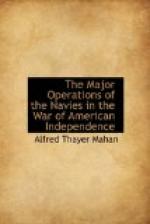On approaching Gibraltar, the continuance of bad weather, and the strong easterly current of the Straits, set many of Rodney’s ships and convoy to leeward, to the back of the Rock, and it was not till the 26th that the flagship herself anchored. The storeships for Minorca were sent on at once, under charge of three coppered ships of the line. The practice of coppering, though then fully adopted, had not yet been extended to all vessels. As an element of speed, it was an important factor on an occasion like this, when time pressed to get to the West Indies; as it also was in an engagement. The action on the 16th had been opened by the coppered ships of the line, which first overtook the retreating enemy and brought his rear to battle. In the French navy at the time, Suffren was urging the adoption upon an apparently reluctant Minister. It would seem to have been more general among the British, going far to compensate for the otherwise inferior qualities of their ships. “The Spanish men-of-war we have taken,” wrote Rodney to his wife concerning these prizes, “are much superior to ours.” It may be remembered that Nelson, thirteen years later, said the same of the Spanish vessels which came under his observation. “I never saw finer ships.” “I perceive you cry out loudly for coppered ships,” wrote the First Lord to Rodney after this action; “and I am therefore determined to stop your mouth. You shall have copper enough.”
Upon the return of the Minorca ships, Rodney put to sea again on the 13th of February, for the West Indies. The detachment from the Channel fleet accompanied him three days’ sail on his way, and then parted for England with the prizes. On this return voyage it fell in with fifteen French supply vessels, convoyed by two 64’s, bound for the Ile de France,[74] in the Indian Ocean. One of the ships of war, the Protee, and three of the storeships were taken. Though trivial, the incident illustrates the effect of operations in Europe upon war in India. It may be mentioned here as indicative of the government’s dilemmas, that Rodney was censured for having left one ship of the line at the Rock. “It has given us the trouble and risk of sending a frigate on purpose to order her home immediately; and if you will look into your original instructions, you will find that there was no point more strongly guarded against than that of your leaving any line-of-battle ship behind you.” These words clearly show the exigency and peril of the general situation, owing to the inadequate development of the naval force as compared with its foes. Such isolated ships ran the gantlet of the fleets in Cadiz, Ferrol, and Brest flanking the routes.
[Footnote 70: An anchorage three miles to seaward of Spithead.]
[Footnote 71: Chevalier, “Marine Francaise,” 1778, p. 165. Author’s italics.]
[Footnote 72: In line “abreast,” as the word indicates, the ships are not in each other’s wake, as in line “ahead,” but abreast; that is, ranged on a line perpendicular to the course steered.]




